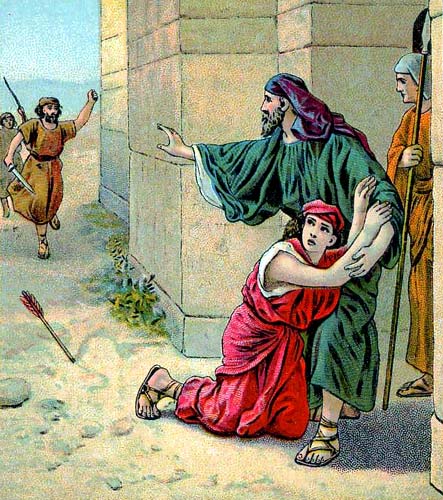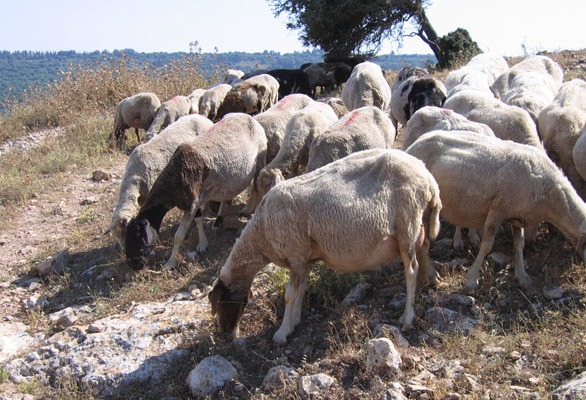by Lois Tverberg & Bruce Okkema
The heavens declare the glory of God; the skies proclaim the work of his hands. Day after day they pour forth speech; night after night they display knowledge. There is no speech or language where their voice is not heard. Their voice goes out into all the earth, their words to the ends of the world. (Psalm 19:1-4)
It’s impossible not to praise God for his wonderful handiwork in all the natural beauty around us. Much of the Bible also seems to rejoice in God’s beautiful world. Certainly Jesus peppered his preaching with meditations about such things as mustard seeds, ravens, and lilies of the field. God declared the creation “very good,” and he often used its beauty and remarkable design to point to himself.
 When Job came to God with the ultimate questions of life, God’s response was to describe the grandeur of creation — the constellations, the rain and thunder, the ostriches and mountain goats. Who created these, God asked? And could Job do the same (Job 38-41)? An honest look at the gorgeous, intricate design of this world should leave us humbled, realizing that God has reasons for his actions that are often beyond our understanding.
When Job came to God with the ultimate questions of life, God’s response was to describe the grandeur of creation — the constellations, the rain and thunder, the ostriches and mountain goats. Who created these, God asked? And could Job do the same (Job 38-41)? An honest look at the gorgeous, intricate design of this world should leave us humbled, realizing that God has reasons for his actions that are often beyond our understanding.
As filled as the Scriptures are with meditations on God’s handiwork, many of us haven’t spent a lot of time thinking about how we should relate to the natural world. If anything, some of us are put off by people who love nature too much. What attitude does God want us to have, that neither idolizes his creation, nor neglects his calling to care for his garden and rule as his representatives on earth? If we look again at the scriptures in their Hebraic context, we find that God actually does give us instruction in these things.
Having an Attitude of Thanksgiving
In Psalm 24:1 it says, “The earth is the Lord’s and the fullness thereof,” and the rabbis of Jesus’ day believed everything we enjoy in life should cause us to thank God. As a result, they instituted a wonderful system of brief prayers of “blessing” (berachah, pronounced BRA-khah, plural – berachot) that were prayed dozens of times throughout the day.
The idea was not to bless objects to make them holy, but to “bless the Lord” for each good thing, focusing on him as the source of all blessing. When Paul challenged his readers to “pray continually, give thanks in all circumstances” (1 Thes. 5:16 -18), he was probably thinking of this practice that both he and Jesus most likely took part in, and orthodox Jews do even to this day.1
In the most ordinary things they found ways of praising God, and many of these focused on reminding oneself of God’s sustenance of our lives and of creation. A person’s first thoughts upon waking were to thank God for giving them life to live another day: “I thank you, living and eternal King, for returning my soul within me in compassion, great is your faithfulness.”
They probably would have been awaken by a rooster’s crow. So in the first century they would have said, “Blessed is he who has given to the rooster understanding to distinguish between day and night.” And, when they opened their eyes they said, “Blessed is he who opens the eyes of the blind!” No day could start without numerous reminders of God’s love, and these small prayers arose often through their day.2
 Encountering the world around them gave them many reasons to bless the Lord. When they saw the first flowers on the trees in the spring, they said, “Blessed is he who did not omit anything from the world, and created within it good creations and good trees for people to enjoy!” When they heard thunder or an earthquake they said, “Blessed is he whose strength and power fill the world!” (Next time there is a windstorm, step outside and meditate on God’s awesome power.) Even when they smelled an orange or lemon, it was an occasion to bless the Lord by saying, ”Blessed is he who gives pleasant fragrance to fruit.”
Encountering the world around them gave them many reasons to bless the Lord. When they saw the first flowers on the trees in the spring, they said, “Blessed is he who did not omit anything from the world, and created within it good creations and good trees for people to enjoy!” When they heard thunder or an earthquake they said, “Blessed is he whose strength and power fill the world!” (Next time there is a windstorm, step outside and meditate on God’s awesome power.) Even when they smelled an orange or lemon, it was an occasion to bless the Lord by saying, ”Blessed is he who gives pleasant fragrance to fruit.”
I find it interesting that they believed that even man-made things were ultimately created by God. One of the main blessings that is said before eating is, “Blessed is he who brings forth bread from the earth.” If you think about it, however, bread does not come directly from the earth! It is an “artificial” product that has been processed and modified by human effort, but yet the ancients saw that God should be thanked for it.
They have other prayers to thank God for things like medicine and human intelligence too. What an idea! Could we thank God for even our technology, seeing it as God’s handiwork, made through the gift of our minds and hands?
What was the point of these prayers? The effect was to instill a continual feeling of gratitude and a sense of God’s presence around them. We do a similar thing in a smaller way when as children we learn to say “thank you” or to pray before meals. Along with the habit of saying “thank you,” we develop an inward attitude of gratefulness whenever we receive some kindness.
Similarly, when most of us sit down in front of a table of food, we immediately have the urge to fold our hands together — an ingrained reminder that we should thank God. Through an outward practice, we learn an inward attitude. When Paul and other Jews learned the habit of these prayers, they cultivated in themselves a much more extensive habit of gratitude to God.
Looking at God’s creation, it seems that our response should be to cultivate in ourselves an attitude like this — feeling humbled by God’s presence, and grateful for his gracious care.
Bal Tashchit – Do Not Destroy
How does our worship of God for his creation impact our actions? Does it mean that we can’t modify the earth or use it for our needs? Western Christians tend to disconnect God with his creation, and see the world as entirely ours for disposal as we see fit. This is because we tend to see God as far away in heaven, uninterested in material things.
This attitude comes from our Greek cultural ancestors, who considered the material world to be worthless and evil, and God as utterly unconcerned with it. The Scriptures, in contrast, say repeatedly that God created the world very good, and that creation itself groans for its redemption which will come in the end (Rom 8:21).
 We might think God never commented on how we should treat the earth, but the rabbis pointed out that God shared his feelings in a specific case in Deuteronomy 20:19. It says, “When you lay siege and battle against a city for a long time in order to capture it, you must not destroy (lo tashchit) its trees, wielding an ax against them. You may eat of them, but you must not cut them down. Are the trees of the field people, that you should besiege them?”
We might think God never commented on how we should treat the earth, but the rabbis pointed out that God shared his feelings in a specific case in Deuteronomy 20:19. It says, “When you lay siege and battle against a city for a long time in order to capture it, you must not destroy (lo tashchit) its trees, wielding an ax against them. You may eat of them, but you must not cut them down. Are the trees of the field people, that you should besiege them?”
In this verse, God forbade the destruction of the fruit trees outside of cities that were under siege by the Israelites during war. It was common practice during wartime to destroy the land — to chop down the trees and poison the fields by sowing them with salt. God expressly forbade this kind of wanton destruction and declared that the trees were “innocent bystanders” who should not be victims of the war.
The rabbis concluded that if God forbade the destruction of the environment in the dire situation of war, he must certainly oppose it during peacetime. They then reasoned that modifying the environment to build useful things to serve human needs is fine, but needless destruction is wrong.
They also concluded that the reason destroying fruit trees was forbidden was because God gave the trees to provide food, and when we destroy any useful thing, we insult God’s gracious care for us. To them, these words against needless destruction should teach us not to waste any useful thing. The ethical command was called bal tashchit (bahl-tahsh-KEET), meaning “do not destroy.”3
Whoever breaks vessels, or tears garments, or destroys a building, or clogs a well, or does away with food in a destructive manner violates the commandment against bal tashchit. (Talmud, Kiddushin 32a, written about 500 AD)
Because of this interpretation of Deuteronomy 20:19, there has been an ethic of conservation and avoidance of waste in Judaism for thousands of years. They see it as an act of reverence for God. One 18th century rabbi, Sampson Hirsch, said that when we preserve the world around us, we show that we believe that God owns all and is above all.
If we needlessly destroy, we show our self-centeredness and lack of regard for the gifts and will of God. They said that one mark of a righteous person was that he appreciates God’s wonderful design of everything so much that seeing the needless destruction of anything brings him pain. A wicked person doesn’t see God’s handiwork and selfishly wants to destroy, just to show his own power. Waste and excess therefore come from self-idolatry, when we say we are sovereign over our world, not God himself.
What if we regarded all our possessions as gifts from God? Would we be wasteful and throw away usable things? Would we instead try to give them to someone who needs them? What we do with our gifts shows how we see the One who gave them to us; and when we conserve resources to share them with others, we are actually fulfilling both the command to love God and the command to love our neighbor. We are showing our gratitude to the God who provides for us, and we are caring for those around us as well.
Revering the God of Creation
Human knowledge has barely begun to understand the beautiful intricacy of every atom, cell, tree, planet and galaxy. If God in his infinite knowledge called his design of the world “very good,” it must show his brilliance and magnificence in ways beyond what we could ever imagine. It shouldn’t surprise us to hear that when God created the universe, “the morning stars sang together and all the angels shouted for joy” (Job 38:7)!
Instilling in ourselves a reverence for God’s work will make us feel like the world is saturated with God’s presence, and that we are under his constant care. The Lord told us to love him with all of our hearts, minds and souls, and being mindful of his glory in all that is around us will take us a long way toward that goal.
Majesty In Creation
A great designer fashioned this
with such detail that we will miss
the unity and regal power
that hides within the smallest flower.
It spreads itself across the sky
we cannot know how far or high.Stop and listen, you will hear
a croaking frog, a running deer,
an eagle flying overhead,
a chipmunk dashing just ahead.
Each life designed for such a thing,
as best it suits Creator King.It all together fits as one,
there’s not one place that’s left undone.
Yet nothing ever stays the same,
and when you look, all bears his name.
Take a walk, drink in the glory,
then go out and tell his story.
~~~~
For those who wish to cut back on waste by giving away unwanted items, check out www.freecycle.org. This is a network of email groups in which members offer unwanted items to other list readers who live in the same area. Groups are available all over the U.S and around the world. A similar Facebook group is “Buy Nothing” where you can post items that you are giving away for free.
1 In several places the gospels suggest that Jesus and his audience participated in the Jewish practice of “blessing the Lord.” See “The Richness of Jewish Prayer.” See also Jesus the Jewish Theologian, B. Young, Hendrickson © 1995, pp. 119 – 125.
2 In the first century, these prayers simply began with “Blessed is he,” but now each prayer begins with “Blessed art Thou, King of the Universe,” in order to remind the speaker of God’s sovereignty. A nice list of blessings is available from Hebrew for Christians.
3 More on Bal Tashchit in Jewish tradition at the following links:
Bal Taschit: The Torah Prohibits Wasteful Destruction
Judaism and Environmentalism: Bal Taschit
Photos: Luca Micheli on Unsplash, Yoksel 🌿 Zok on Unsplash, Michael Weidner on Unsplash






















